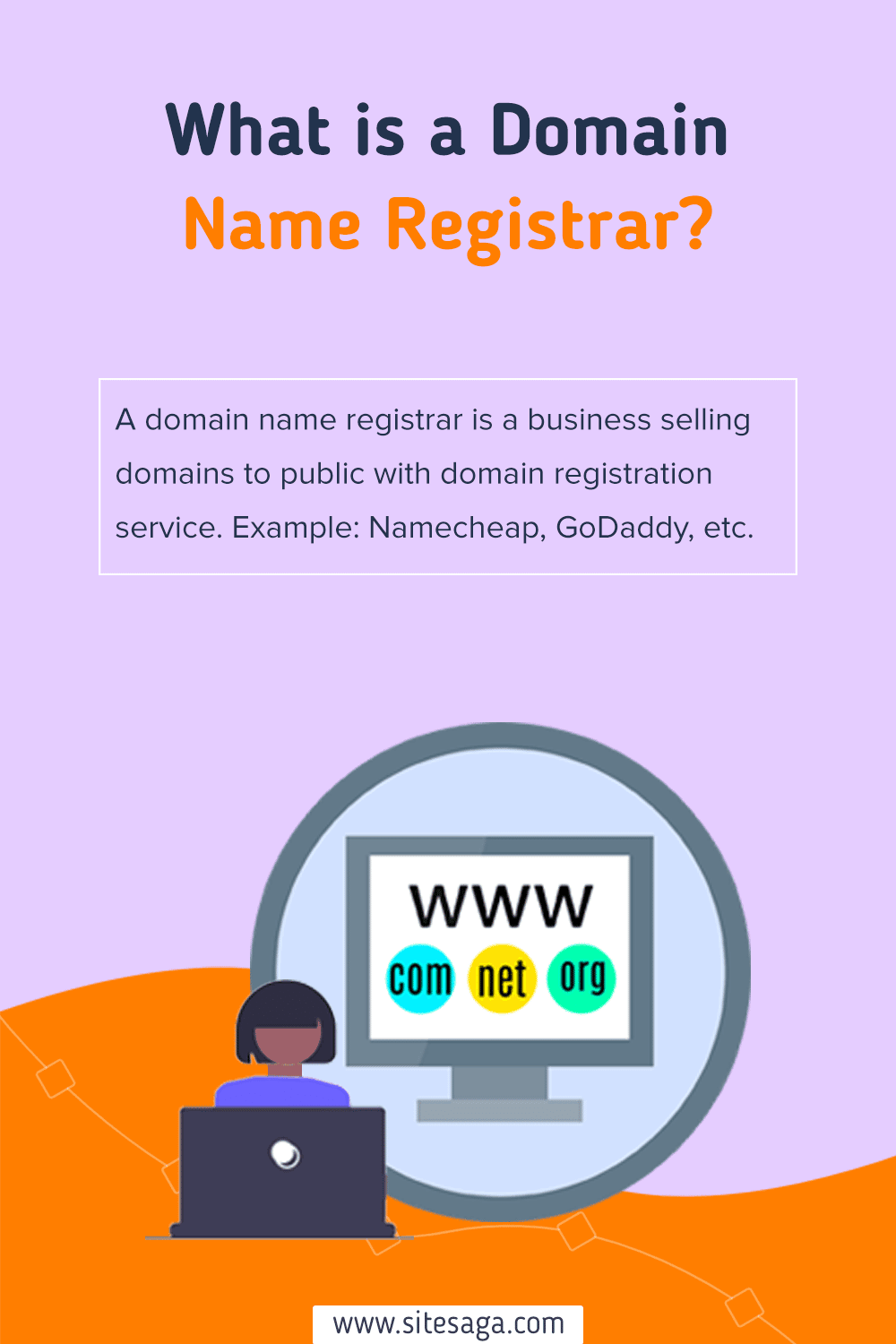Do you want to know what a domain registrar is? Or wondering which are the best domain registrars to buy a domain name? If yes, then here’s what you’re looking for.
Domain names are a crucial part of websites on the internet. To get a domain name for a website, you need to register and buy it from a domain name registration company. Such a company is called a ‘domain registrar’.
A domain name registrar is a business that sells domain names and offers domain registration services to the public. It also provides other services, like web hosting, SSL certificates, etc.
In this article, we’ll explain what a domain registrar is in detail. Also, we’ll look at some examples of domain name registrars available on the market.
So, stay with us till the end. Now, let’s get rolling!
A) What is a Domain Name? – An Overview
A domain name is the unique name and address of a website. Every site has a distinct name and an address to let everyone identify it on the web.
For instance, ‘www.sitesaga.com’ is the domain name of our website. With this name, our website gets identified among all the other websites on the internet. And with this address, every user can access our website once they type it into their browser’s address bar.

Similar to your physical address or phone number, there can’t be 2 identical domain names on the internet. Unquestionably, it’s the most important part of your website.
Basically, there are 2 parts of a domain. They are:
- Top-Level Domain (TLD): The end part of the domain names that are meant to define the location of websites. Here, ‘.com’ is the TLD on our site ‘www.sitesaga.com’.
- Second-Level Domain (SLD): The part of domains that come before TLD and state the brand or website identity. Here, ‘sitesaga’ is the SLD on our website ‘www.sitesaga.com’.
Do you want to learn about domain names briefly?
For more information on domain names, check out our guide on what a domain name is. Just click on the link below:
With this brief overview of domain names, let’s go in-depth on domain registrars.
B) What is a Domain Registrar? How Do Domain Registrars Work?
A domain registrar or sometimes DNS (Domain Name Server) registrar is a business that sells domains. Moreover, it’s a company where you can register a domain name for your website.

In simpler terms, a domain name registrar handles the domain name reservations. Also, they assign IP addresses for those domain names.
For example, some of the most popular domain registrar companies are Namecheap, Domain.com, GoDaddy, Name.com, etc. To know more, check out our article on the best domain registrars!
Furthermore, domain registrars must be Internet Corporation for Assigned Names and Numbers (ICANN) accredited. Here, ICANN is a non-profit organization that manages domains.
So, let’s know in detail how domain registrars work.
How Do Domain Registrars Work?
ICANN is at the top of the domain registration process. Under its authority, there are individual organizations for registry services.
Here, a registry is a database that stores all the domain name data. Similarly, registry services are organizations that manage specific TLDs. Like .com, .net, .uk, etc.
But organizations that manage registries don’t sell the domains directly. So to make the domain names available, they delegate the work to domain registrars.
For example, VeriSign is the registry service organization of .com domains. They manage the .com domains but don’t sell the domains. To get a .com domain, you’ve to purchase one from registrars, like Namecheap.

On top of that, all domain registration companies aren’t licensed to sell all domain name extensions. Some only sell domains with country-specific TLDs.
Hence, a domain registrar should be officially authorized by ICANN. Then only you can register and purchase domains from them.

When a domain registrar sells a domain to a customer, it first contacts the requested TLD service. After that, they update their registry record to add your information.
Furthermore, they delegate your domain to Name Servers. So, once a domain name is entered into the web browser, DNS translates the domain name into an IP address.
As a result, your website will open up in the computer browser. This shows how domain registrars and the domain registration process work.
C) What’s the Difference Between Domain Registrar, Registry, and Registrant?
You may have understood domain registrar and registry in general. Now, let’s learn the differences between the domain registrar, registry, and registrant further.
A domain registry is a database with all available domains and their owner’s personal information. When a person creates a domain name, the domain name is added to this list.
While registries also mean the registry service organizations responsible for managing their registry. And that registry includes all the domains for the specific TLD they administer.
On the other hand, domain registrars are businesses that sell domains to the public. For that, they have some access to the registry of TLDs they sell.

For more details, check the comparison table below:
| Domain Registry | Domain Registrar |
| A central organization that actually registers and administers the TLD domains in the DNS. | An ICANN-accredited organization that performs commercial marketing of domains. |
| Doesn’t have direct contact with domain owners and the public. | Works as an intermediary body between registry and domain buyers. |
| Takes control of domain registrars to some extent but doesn’t take part in marketing. | Can add prices to sell domains and may provide additional support to customers. |
| Example: VeriSign is the registry of .com domains. | Example: Namecheap is a domain registrar selling domains, including the .com domains. |
Lastly, registrants are people planning to purchase a domain name or already have one. When you undergo the domain selection and purchasing steps from a domain registrar, you become the domain registrant. This stays as long as you have the domain subscription.
With that, let’s move forward!
D) How Do Domain Registrars Protect User Privacy?
User privacy is a crucial thing to consider when selecting a domain registrar. So, you must see how domain registrars are protecting their user’s privacy.
The first thing to point out is what information is at risk when you register a domain. Domain registrars assign an IP address to your domain and get access to your personal information. That includes your name, email, physical address, and contact number.

So, most domain registrars take their ways to protect your information. And the most popular way they do this is by offering the ability to hide personal information. This secures your information from strangers. This is called the WHOIS Privacy.
Additionally, registrars also have a private registration option. Here, the registrar will provide their own information in the WHOIS listing for that domain. So, they act as a proxy for the registrant. While the actual registrant’s information will remain saved only in the registrar’s database.
On top of that, domain registrars also provide DNS security. This prevents domain hijacking.
ICANN makes registrars undertake steps for preventing domain hijacking and maintaining DNS security. Some of them are:
- Use domain locks to keep your domain safe from getting transferred or updated without unlocking it on your account.
- Whenever there’s a change in domain, its records must be kept about that.
- There must be enhanced identity verification when undergoing registration processes.
Thus, domain registrars protect your domains and information against hackers. And most companies do this by offering a paid protection service.
However, Namecheap is a domain registrar that offers free domain privacy protection. They also:
- Hides your contact details from the public WHOIS database.
- Prevents your inbox from spam emails.
- Gives free service for life. Even with a new registration or domain transfer.
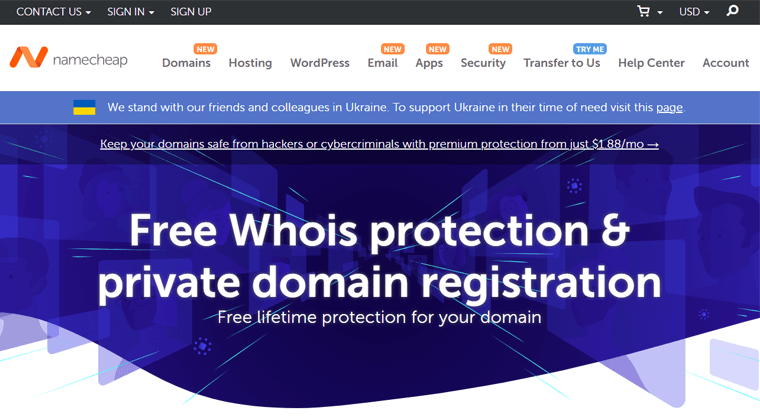
E) How to Choose the Best Domain Registrar?
There are many domain registrars providing popular and country-specific domain names. But before registering a domain in a domain registrar, you must consider many things.
The following points are the things to keep in mind for choosing a domain registrar. So, here we go!
- Pricing and Registration: You must pick a registrar with a price under your budget after going through the registration and renewal fees. Also, there shouldn’t be any hidden fees.
- A Set of TLDs: Not every registrar offers the same TLDs. If you want to use a specific extension, then look if the registrar offers it. Some popular TLDs are .com, .org, .net, etc.
- Other Products/Services: Your registrar should offer a combined solution or add-ons for extra features. Like hosting, SSL (Secure Socket Layer), domain privacy, and more.
- Domain Name Transfer: If you want to switch to a different domain registrar, then you can transfer the domain name. So, check if a hassle-free transfer with minimum cost is possible.
- Trustworthy Customer Service: You can check the support options of the registrars. Also, read reviews on their service and features to know if they offer quality support.
- Expiration Policy: Domain registrars should offer a good expiration policy like enough renewal period or auto-renewal. So that your domain won’t be taken down without notice.
Once you’re aware of your needs, you can select a domain name. For that, we’ve shortlisted the top domain registrars. So, let’s move forward.
F) 5 Best Domain Registrar Examples to Buy a Domain Name
Here, let’s look at the best domain registrar examples. Registering with any domain registration company, you can easily buy a domain name for your website.
So, let’s jump right into it!
1. Namecheap
Namecheap is an affordable domain registration and web hosting platform. It has a powerful domain price search tool to find popular TLDs at competitive prices. Moreover, it’s a popular company since millions of small to big businesses use Namecheap for domain registration.
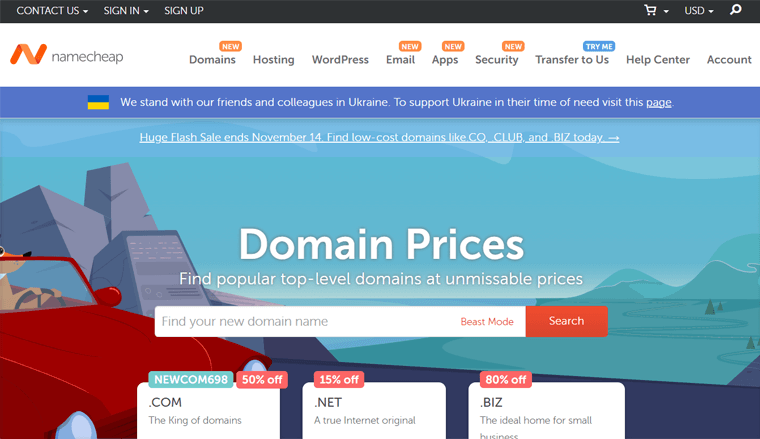
Pricing
The following table shows the price options and features available for some domains:
| Top-Level Domains / Features | .com | .co | .net | .org |
| Registration Price (Per Year) | $9.58 | $4.98 | $10.98 | $7.48 |
| Renewal Price (Per Year) | $14.58 | $28.98 | $14.98 | $14.98 |
| Transfer Price (Per Year) | $9.78 | $4.98 | $10.98 | $10.98 |
| Free Email Address | 2-months free trial | 2-months free trial | 2-months free trial | 2-months free trial |
| Free SSL | No | No | No | No |
| Free Privacy Protection | Yes | Yes | Yes | Yes |
If you’re registering your first domain, then you can get a Namecheap .com domain for $6.98/year. So, use the promo code ‘NEWCOM698’ and get this deal.
In addition, this domain registrar also offers other domains like .store, .link, and more for 99 cents. You can learn about that from Namecheap’s 99 cents domain names page.
Also, if you purchase their hosting plans, you’ll get free SSL certificates.
Check out the best alternatives to Namecheap. You may find them cheaper and suitable for your domain and hosting.
2. GoDaddy
GoDaddy is an all-in-one domain registration and web hosting platform with lots of tools. You can find a domain generation tool in GoDaddy that lets you conduct domain searches. Then, you can select a domain from 500+ popular and premium extensions like .com, .net, .app, etc.

Pricing
The table below depicts the prices of the GoDaddy domains for some popular extensions:
| Top-Level Domains / Features | .com | .site | .one | .org |
| Registration Price (1 Year) | $20 | $1.62 | $2.99 | $17 |
| Renewal Price (Per Year) | $28 | $55.12 | $18.08 | $30 |
| Free SSL | No | No | No | No |
| Free Privacy Protection | No | No | No | No |
Do you want a better alternative to GoDaddy? Then, go through the best GoDaddy competitors.
3. Domain.com
Another popular domain name registrar best for small businesses is Domain.com. It offers an extensive set of TLDs and country-code Top Level Domains (ccTLDs). Further, you’ll also get multiple useful tools and features for businesses like marketing services, website builders, etc.
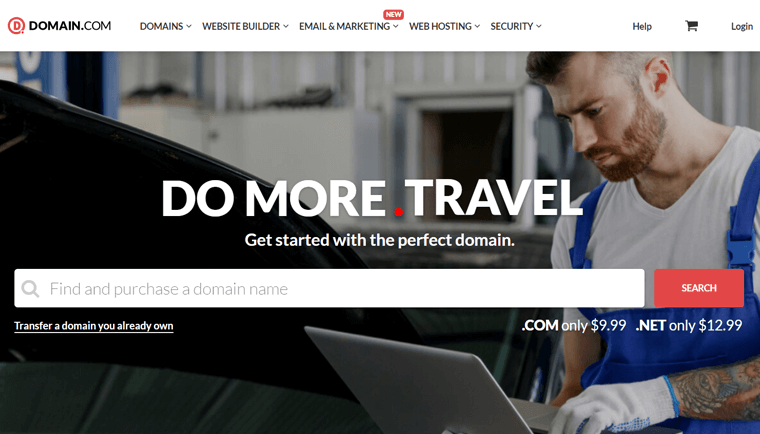
Pricing
Now, let’s check out the price options for some domain extensions on Domain.com.
| Top-Level Domains / Features | .com | .me | .store | .blog | .org |
| Registration Price (Per Year) | $9.99 | $3.99 | $9.99 | $6.99 | $8.99 |
| Renewal Price (Per Year) | $19.99 | $19.99 | $49.99 | $32.99 | $19.99 |
| Free SSL | No | No | No | No | No |
| Free Privacy Protection | No | No | No | No | No |
4. Name.com
Name.com is a flexible domain registrar that lets you get a suitable domain name for any business. It gives web hosting services and allows connecting the domain with your Google products. On top of that, its partnership with Wix makes it possible to easily create your site and save big.
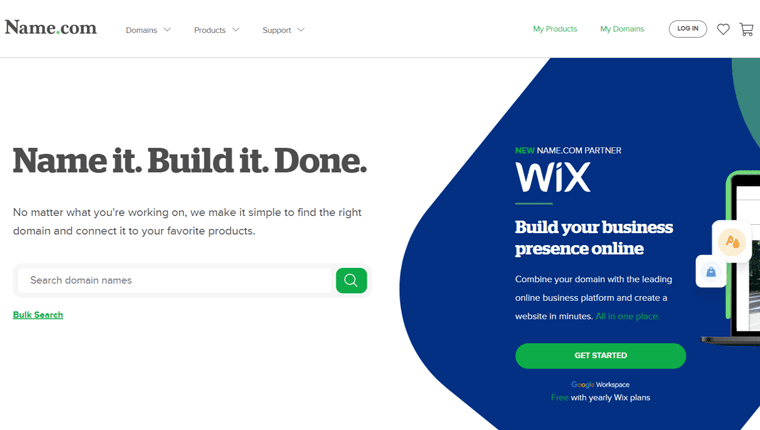
Pricing
With that, let’s look at the pricing plans of Name.com for some popular extensions.
| Top-Level Domains / Features | .com | .co | .net | .org |
| Registration Price (Per Year) | $10.99 | $12.99 | $12.99 | $8.99 |
| Renewal Price (Per Year) | $15.99 | $30 | $16.99 | $12.99 |
| Transfer Price (Per Year) | $9.99 | $30 | $10.99 | $10.99 |
| Free Email Address | 90-day free Titan Pro trial | 90-day free Titan Pro trial | 90-day free Titan Pro trial | 90-day free Titan Pro trial |
| Free SSL | No | No | No | No |
| Free Privacy Protection | No | No | No | No |
5. Network Solutions
Network Solutions is an all-rounder domain registrar with many features to build an online web presence for businesses. Here, you can buy a domain from TLDs like .com, .net, .biz, .info, etc. Also, you get to have private domain registration that hides personal information.
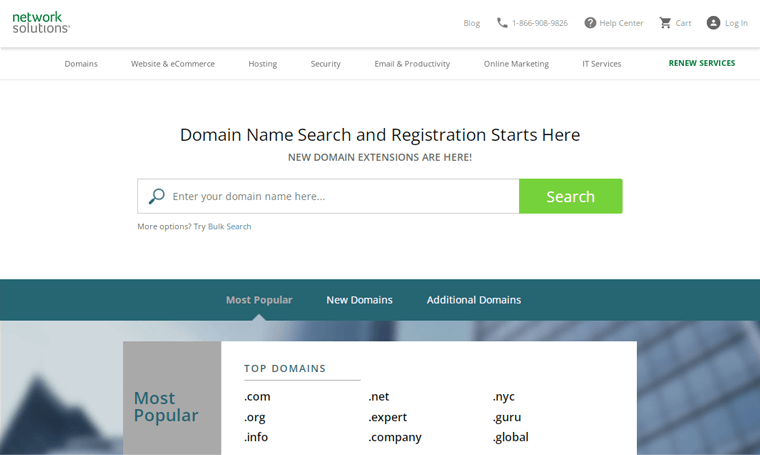
Pricing
Network Solutions have different price options for domains depending upon the TLDs. However, it doesn’t disclose the prices for everyone. So, you can search for a domain first to know the price.
By adding the domains with some TLDs on the cart. The prices found on most domains are:
- For 1 Year: $25
- For 2 Years: $50
- For 3 Years: $60
- For 5 Years: $100
- For 10 Years: $200
- For 20 Years: $400
- For 100 Years: $500
Moreover, it offers email services and SSL certificates for your domains, like most domain registrars. However, they aren’t free and take extra charges.
Are you a beginner just planning to make a website? If yes, then read our complete guide on how to build a website from scratch.
G) FAQs on Domain Registration
Following are the frequently asked questions on domain registration and domain registrars. So, go through them to know the answers to your doubted queries.
You may have come up with a list of domains you want to register. If not, then use a domain name generator tool that gives ideas and possible options. Once you have a few best options, you must check their availability using a WHOIS search tool. While some registrars already have this ability.
Computer systems recognize site addresses from IP addresses and not domains. Hence, domain name servers translate between domain names and IP addresses. It also ensures that machines exchange the right data and that users view the correct webpage when opening the domain.
No, you can’t buy a domain name forever. Usually, domain reservations are done yearly. However, you can prepay for up to 10 years. This makes the domain name yours for 10 years. The domain will remain yours as long as you continue paying the annual renewal fee.
Domain registrars offer discounts on first-year domain registration fees. Then, the renewals occur at the regular price, making it seem more expensive. Thus, we suggest pre-paying for the registration fee for some years to get great discounts.
Resellers are organizations that also sell domain name registrations. These resellers sell domains on behalf of registrars in return for a finder’s fee. Resellers are legitimate but usually work as a side business. So, you may not get dedicated customer support from them like registrars.
Normally, you must fill out the domain registration form with your information. Then, registrars will give you a domain with that information. But with private domain registration, your personal information is confidential. This means the registrar will use their own contact information instead to get a domain for you.
Conclusion
And that’s the end of this article. Here, we explained what a domain registrar is. Also, we came up with a list of the best domain registration platforms for your example.
Hopefully, you understood domain registrars and could find a suitable registration provider to get a domain name for your website.
Among all the domain registrars, we recommend using Namecheap. Because it offers affordable price options for domain names and gives free services like email addresses and domain privacy.
If you have any more confusion, then comment down. We’ll be pleased to guide you in every way.
Also, check out our blogs on the best WordPress sitemap plugins and how to build a WordPress website without hosting and a domain.
If you liked this article, then share it with your friends. You can even follow us on our Facebook and Twitter for updates.
Some of the links on this article/page are affiliate links. If you click on such an affiliate link and purchase the product, we’ll earn a specific percent commission from the seller. But it won’t at all affect the price you’ll pay.
